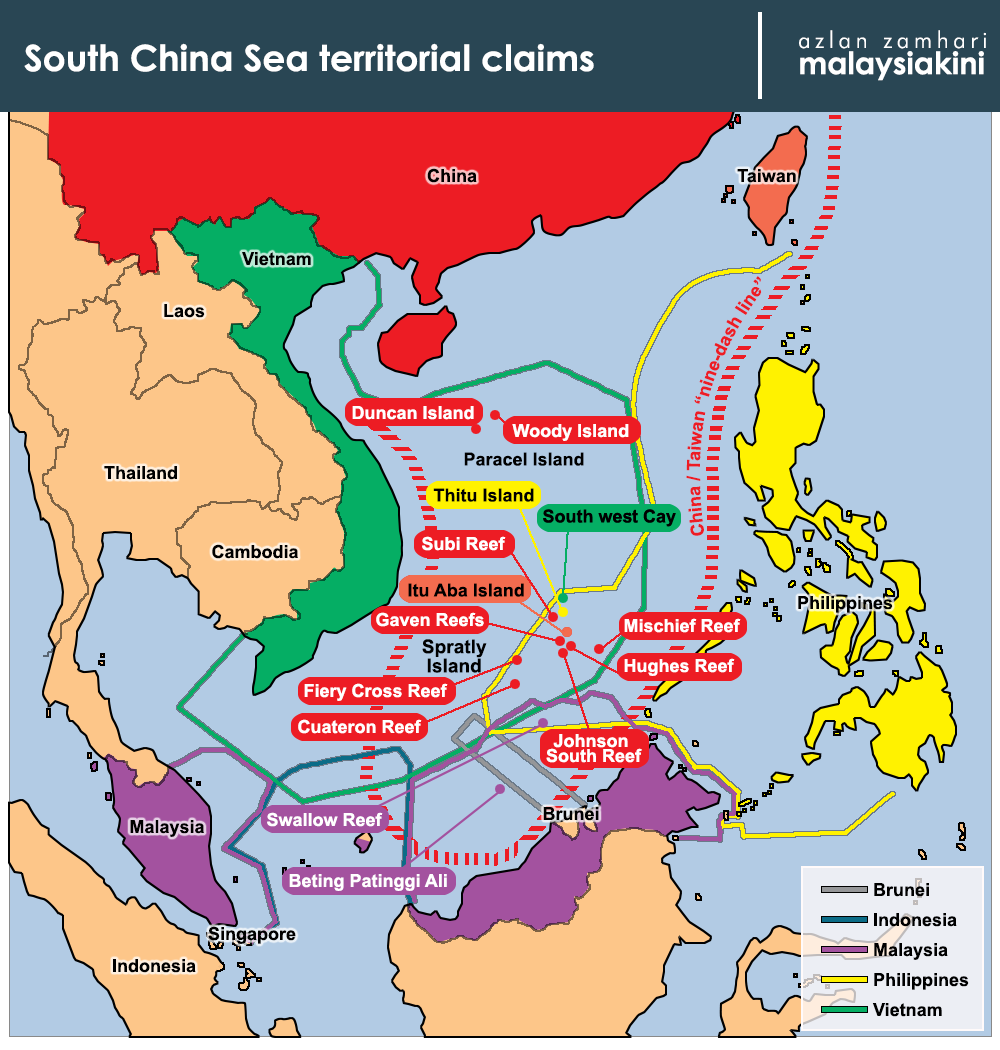About a week ago, a Philippines supply boat in an area where territorial claims are disputed with China, was fired upon with water cannons by two Chinese boats, causing minor injuries and a shattered windscreen.
It sparked a diplomatic incident and disputed accounts by both parties involved.
This was nothing new and has happened before. Not only the Philippines but Brunei, Indonesia, Malaysia, and Vietnam have conflicting claims with China.
China audaciously claims huge swathes of territory in the area through its nine-dash (now 10-dash) map but the Permanent Court on Arbitration in the Hague found no basis for China’s claims way back in July 2016.
Predictably, China has refused to recognise that decision and has not only pushed its claims further but established a presence in disputed territories, including the Spratlys, and engaged in land reclamation works and a military presence.
In other words, China is actively expanding its presence in disputed areas.

One would have thought that the latest incident would have sparked immense outrage among other Asean countries but it did not go beyond the usual platitudes that included a reiteration that disputes must be settled peacefully.
Just a day after the water cannon statement, Prime Minister Anwar Ibrahim expressed support for China - “Right now, China seems to be the leading investor into Malaysia,” he said, and insisted that Malaysians “do not have a problem with China.”
“We are an independent nation, we are fiercely independent, we do not want to be dictated by any force,” Anwar said.
“So while we remain … an important friend to the United States and Europe and here in Australia, they should not preclude us from being friendly to one of our important neighbours, precisely China,” he said, speaking at a joint news conference with Australian Prime Minister Anthony Albanese, a staunch US ally.
“If they have problems with China, they should not impose it upon us. We do not have a problem with China,” Anwar told reporters.
We don’t have a problem with China? Take another look at the map. Look at China’s position and the territory it is claiming (the dashed red line) in the South China Sea. It’s the country furthest away from the place and claiming almost all of it.

The other countries are claiming areas closer to their border. It’s no wonder that the international arbitration court in the Hague found no basis for China’s claims.
Anwar’s support for China, so soon after the water cannon debacle, displays crass insensitivity towards the real problems of a neighbour and founding member of Asean, the Philippines.
That his statement was welcomed by China itself, is a clear indication that Anwar had gone too far.
The other Asean countries involved are - apart from Malaysia and the Philippines - Brunei, Indonesia, and Vietnam.
A far better stance is to have expressed solidarity with the Philippines, decrying the use of force, and supporting the implementation of a code of conduct for the behaviour of those affected in the areas.
Anwar would do better to help organise an Asean summit to counter China’s outlandish claims in the South China Sea which is basically thinly disguised ocean grabbing for the purpose of controlling natural resources, fishing areas, and sea routes.
These pose a real danger to the world and to Asean countries in particular whose firepower is nothing compared to that of China’s - the repeated water cannon incident is a stark reminder of that.
Understand superpowers’ motives
That leaves Asean countries no choice but to ally with the US to counter China’s power at least as far as this is concerned. That requires a nuanced distance from making statements which may jeopardise our position and interests in the future.
Instead, the subtle message we should be sending out is we will ally with whoever takes care of our interests.
Yes, Anwar said that the world should recognise China as a superpower. We should too and recognise that like all other superpowers, China in all its dealings will act only in its own interests, never out of altruistic concerns for its neighbours.
All superpowers throughout the course of history have done that and will continue to do so. The only hope for minor countries is to quickly align with some superpowers when our interests coincide and continue shifting around to those who serve our interests best. We must play their game too.
Our role as the smart pelanduk (mousedeer) in the jungle is to nimbly move around and avoid being trampled by the gajah (elephants) when they fight and bring down everything under their feet.
Simply put, we keep all our options open and play the superpowers against each other the best way we can.
Bravado and teaching the West about China is not our role. We must know our weaknesses but we must not underestimate the strength that comes with intelligent posturing - and a certain amount of grace.
Our neighbour down south has an enormous Chinese majority but look at the way it deals with China and its power. Among the many things we have to learn from them is the quiet art of keeping all bridges intact. - Mkini
P GUNASEGARAM says intelligent diplomacy and posturing are key to dealing effectively with power.
The views expressed here are those of the author/contributor and do not necessarily represent the views of MMKtT.




No comments:
Post a Comment
Note: Only a member of this blog may post a comment.